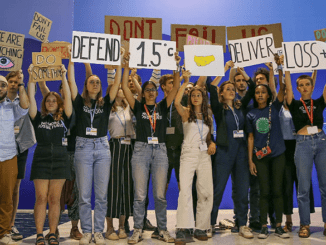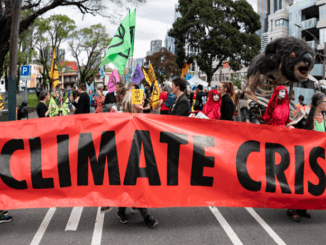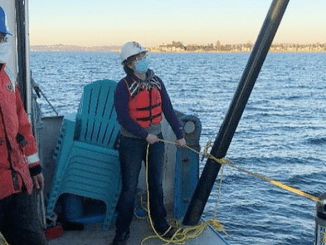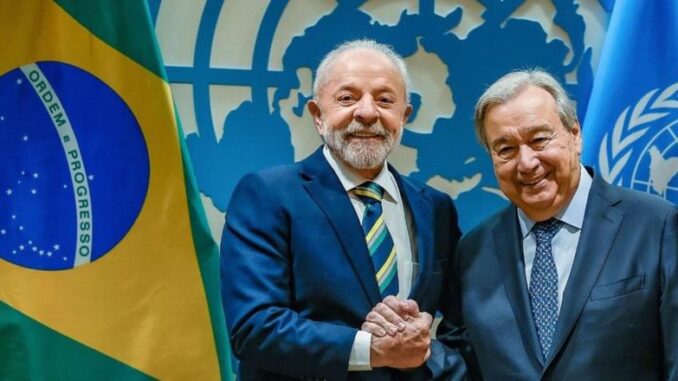
NEW YORK, New York, September 25, 2025 (ENS) – UN Secretary-General Antonio Guterres is hosting a climate ambition summit at the UN’s New York headquarters this week. The high-level week of the UN General Assembly is in full swing, and he is using the event to convince governments to elevate the level of ambition in their national climate pledges to the Paris Agreement ahead of November’s UN climate conference (COP30) in Belém, Brazil.
“The science demands action. The law commands it. The economics compel it. And people are calling for it,” declared the UN Secretary-General in his opening statement to the Climate Ambition Summit.
Brazilian President Lula da Silva co-chaired the Climate Ambition Summit with the secretary-general on Wednesday during the 80th session of the UN General Assembly.
Since the Paris Agreement was signed in 2015, there have been two rounds of Nationally Determined Contributions, NDCs, and a third round is currently underway.
Floods, wildfires, sea level rise, vanishing glaciers, coral bleaching, disappearing species, unbearable heat, disastrous storms – all are the results of climate change.
NDCs are pledges to act to address the climate crisis. These contributions outline each country’s planned actions to reduce greenhouse gas emissions and limit global warming to 1.5° Celsius above pre-industrial levels.
“The Paris Agreement made a difference. Over the past 10 years, the projected global temperature increase has fallen from 4°C to less than 3°C, if current NDCs are fully implemented. Now, we need new plans for 2035 that go much further and much faster,” Guterres said, adding that the targets should cover all greenhouse gas emissions in all sectors.
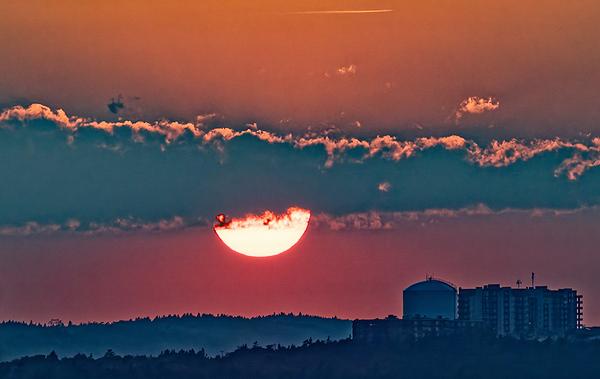
The UN chief spoke plainly. Existing pledges are nowhere near sufficient, and only a fraction of member states have up-to-date NDCs for 2025.
Current national plans would only cut global emissions by 2.6 percent by 2030 compared to 2019 levels, a tiny fraction of the 43 percent reduction that scientists say is needed to keep global temperatures to no more than 1.5 degrees Celsius above pre-industrial levels.
So, the summit is designed as both a pressure point and an opportunity. Before the end of the month, leaders are expected not just to restate commitments, but to announce new NDCs, show how they will be implemented, and highlight how they align with the accelerating clean energy transition.
Some New Climate Targets
The UN plan is working. Close to 100 countries – including nearly 40 Heads of State and Government – today announced, committed to finalizing, or set out their commitment to implementing their new climate targets ahead of COP30.
For the first time, several major economies including China, the world’s largest greenhouse gas emitter, as well as Nigeria, announced economy-wide emissions reduction targets covering all greenhouse gases and all sectors.
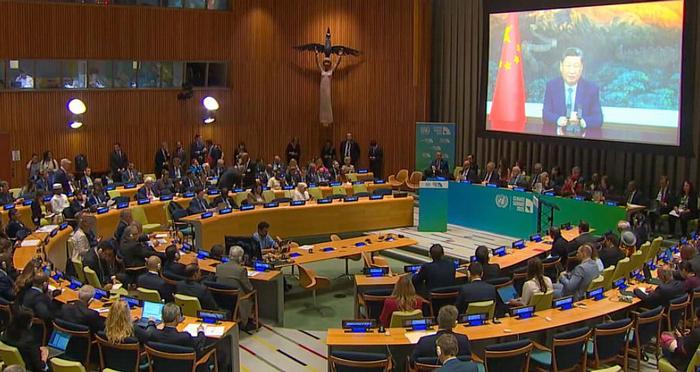
At the meeting, President Xi Jinping announced in a video message that by 2035 China will reduce economy-wide net greenhouse gas emissions by seven to 10 percent from peak levels.
President Xi also pledged to increase the share of non-fossil fuels in total energy consumption to over 30 percent, expand wind and solar power capacity six-fold compared to 2020 levels, and make “new energy vehicles” the mainstream in new vehicle sales, he said.
Nigeria’s new NDC aims for a 32 percent reduction in greenhouse gas emissions by 2035 compared to the 2018 baseline and sets a path to achieve net-zero emissions by 2060.
In the European Union where emissions are down nearly 40 percent since 1990, “the clean transition is moving on,” said European Commission President Ursula von der Leyen.
European countries are “doubling down on global partnerships” and will remain the world’s largest providers of climate finance, she said, while also mobilizing up to €300 billion to support the clean energy transition worldwide.
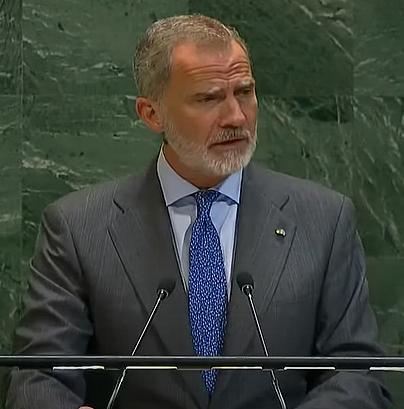
The “triple planetary crisis” – climate change, pollution and biodiversity loss – was featured in the address by King Felipe VI of Spain, who underscored that governments must accelerate a just energy transition.
The King pressed for tripling renewable capacity, doubling efficiency and advancing decarbonization in time for COP30, where Spain hopes to see consensus and ambition.
“These objectives are as ambitious as they are necessary,” he said. “Hesitation can no longer be part of the global equation.”
Vulnerable Nations ‘Between Hope and Hardship’
For the small Central American country of Belize, the 1.5°C goal “is not an aspiration” but “a threshold between hope and hardship, between flourishing communities and forced displacement, between shared prosperity and irreversible loss,” Prime Minister Johnny Briceño said.
Belize’s new NDC covers expanding renewable electricity generation to cover 80 percent of domestic needs by 2035, restoring some 25,000 hectares (96 square miles) of degraded forest, and planting a million trees over the next three years.
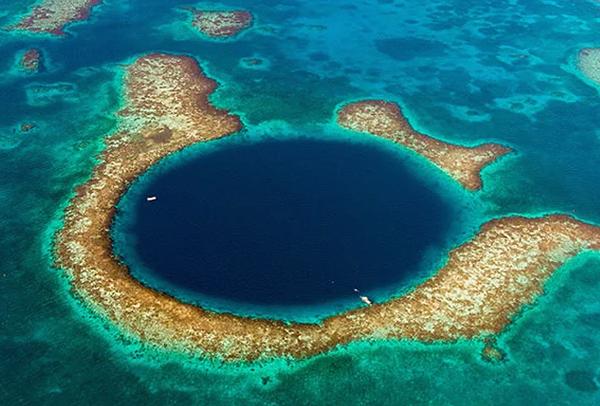
“But let me be clear, ambition can only succeed if matched by support for small climate-vulnerable nations like Belize,” Briceño said.
“This means scaled up, predictable finance; accessible technology and genuine partnerships,” he said. “Success depends on all of us acting with unprecedented urgency, solidarity and climate justice.”
Other nations detailed ambitious renewable energy goals, plans to curb methane emissions, strategies to safeguard forests, and measures to phase out fossil fuels.
The UN Secretary-General also emphasized that these new NDCs must reflect the acceleration of a “globally just energy transition. Your new plans can take us a significant step forward,” he said.
President Lula Finds Strength in Multilateralism
President Lula noted that, while countries are free to plan their own emissions reduction strategies, submitting these plans to the United Nations Framework Convention on Climate Change, UNFCCC, “is not optional.”
Brazil was the second country to present its new NDC, in November of 2024. It intends to reduce all greenhouse gases by between 59 percent and 67 percent%, and end deforestation by 2030.
“In a world where serious violations have become commonplace, failing to present an NDC may seem like a lesser evil. However, without a collective set of NDCs, the planet is walking in the dark. Only with the full picture will we know where we are headed and at what pace,” the Brazilian leader emphasized.
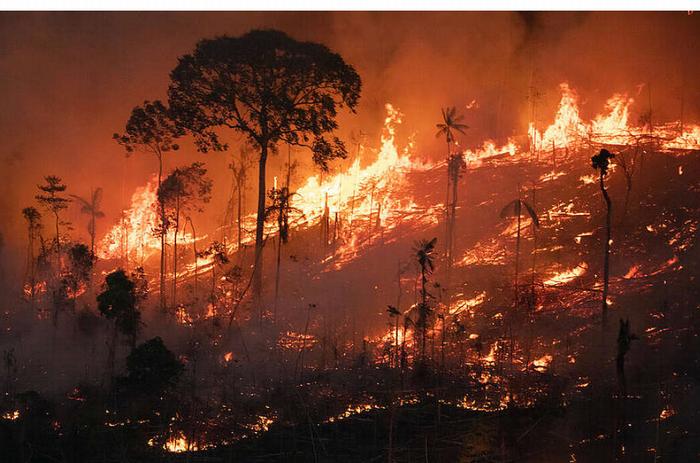
Lula stressed that complying with the climate agreement reinforces multilateralism. “No one is safe from the effects of climate change. Border walls won’t stop droughts or storms. Nature does not bow to bombs or warships. No country stands above another,” he said.
“I appeal to the countries that have not yet submitted their nationally determined contributions (NDCs): The success of COP30 in Belém depends on you. Together, let us make the Amazon the setting for a pivotal moment in the history of multilateralism,” Lula urged.
Ambassador Corrêa do Lago, who will serve as the president of COP30 in Belem, emphasized the importance of the Climate Ambition Summit in strengthening multilateralism. “This event is clearly a great success, and everyone is commenting on how much it represents a reaction and a demonstration of confidence in multilateralism and in COP30,” he said.
The deadline for submitting NDCs is the end of September. A total of 198 parties must deliver their contributions; 120 of those parties participated in the Climate Ambition Summit.
Featured image: At the Climate Summit in New York, Brazilian President Lula da Silva, left, and UN Secretary-General Antonio Guterres called for the submission of substantial climate pledges from governments, September 24, 2025, UN Headquarters, New York City, (Photo by Ricardo Stuckert / COP30 PR)
© 2025, Environment News Service. All rights reserved. Content may be quoted only with proper attribution and a direct link to the original article. Full reproduction is prohibited.

